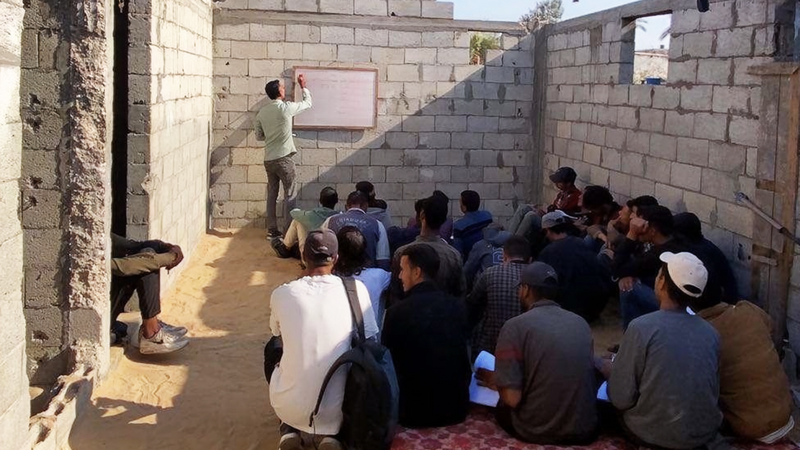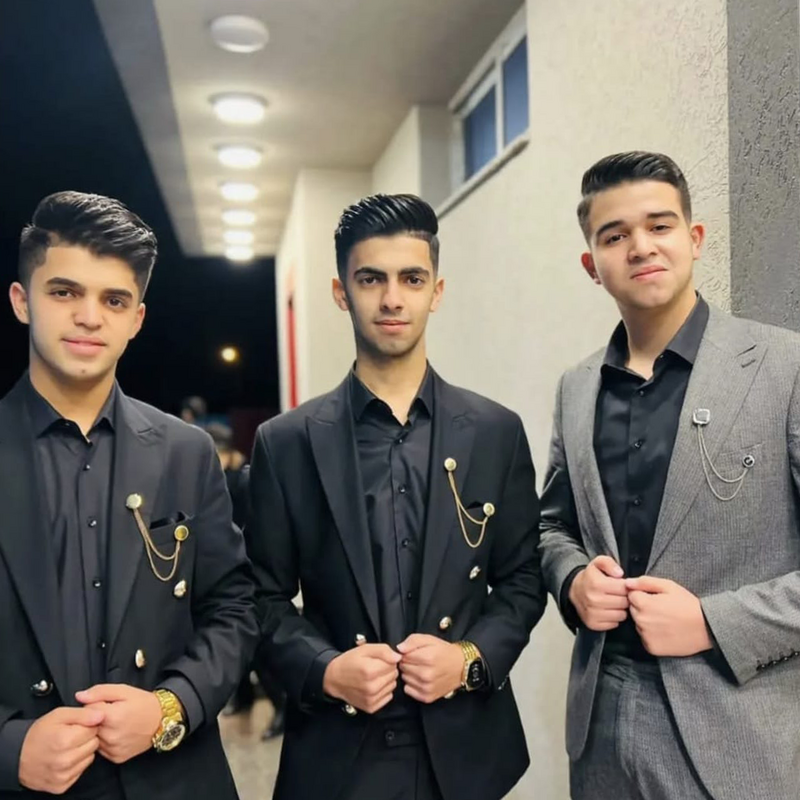The Electronic Intifada 26 June 2025

A teacher gives a mathematics tutoring lesson in a makeshift classroom in Rafah’s Shaboura neighborhood, southernmost Gaza, in May 2024.
In August 2023, I was advancing to the final school year – or tawjihi in Palestine.
Tawjihi is a pivotal year where there is huge pressure to get a score high enough in the matriculation exams, so the student can secure the university major they desire to pursue.
At home, I was constantly called “the tawjihi student,” a nickname that carried pressure, though said playfully.
In hopes of pursuing my dream of studying medicine, I chose the science stream – which includes challenging subjects, particularly physics and mathematics.
I needed to prepare for these two subjects. In June 2023, I enrolled in a special tutoring center in Nuseirat refugee camp, central Gaza, two months before the start of the school year.
I used to attend with my closest friends Suhaib, Yazan and Ihab Darwish – they were cousins.
We always coordinated our schedules so we could attend together, sitting side by side whenever possible.
When the official school year began, the four of us sat together in class.
Tawjihi exclusivity
Becoming a tawjihi student had brought some privileges.
I was excused from the simplest chores – taking out the trash, for example.
My mother treated me like I was the only son, providing every comfort to help me focus.
She would make sure to prepare my favorite meals – baked pasta with béchamel sauce.
Even when she cooked dishes I disliked, she would separately prepare something especially for me – a perfectly cooked chicken breast, for example, or she would buy me shawarma.
The room which I used to share with my brothers, Omran, 15, and Khaled, 8, became mine alone to help me focus and have peace of mind while studying.
My brothers moved to sleep in my sister’s room or sometimes in the living room.
My father didn’t settle for putting me under strict academic discipline – he also bought me a new, comfortable chair to help prevent any back pain from the long hours I spent studying in the same position.
Whenever I left my room for a few minutes, my father would call me out, expecting me to be either studying or planning my next study session.
Whenever I would take a rest or pause to eat and my father passed by, he would remind me that I had no time to waste if I wanted to pursue medicine.
Tawjihi upended
With Israel launching its genocidal war on Gaza, all my preparations for tawjihi were rendered futile, shifting my focus from studying to survival.
In October 2023, my grandmother’s family had to flee their home in al-Rimal neighborhood in Gaza City after the neighborhood was relentlessly bombarded by the Israeli occupation military.
More than twenty people sought refuge in our small apartment in Nuseirat refugee camp.
I found myself suddenly surrounded by crammed rooms, constant movement and noise.
My peaceful study space was turned into a shelter filled with exhausted faces and restless children.
I was no longer exempt from daily chores – my days were consumed by survival tasks: collecting firewood, starting a fire and fetching for water.

Ihab, Yazan and Suhaib (left to right).
Even when the children finally slept, the night wasn’t peaceful either. The buzzing of drones and distant thuds of shelling became my new background noise.
On 19 November 2023, my closest friends – Suhaib, Yazan and Ihab – were murdered in an Israeli airstrike that hit their home in Nuseirat refugee camp.
The four of us grew up together, sitting in the same classrooms year after year throughout elementary school.
Ihab dreamed of studying computer science and becoming a programmer – someone who could solve problems and help people.
Yazan wanted to travel the world, to see something beyond our blockaded horizon.
And Suhaib just wished to live peacefully with his family.
Every time I try to study, I remember Suhaib, Yazan and Ihab. Their deaths left a deep scar.
Tent, a studying room
In January 2024, we were forced to flee our home in Nuseirat and seek shelter in a tent in Rafah – Gaza’s southernmost city.
I only carried some clothing and a few blankets, leaving all my schoolbooks behind.
It took several days to settle into the tent and establish some basic structure – building a private bathroom and securing a stable source of water for daily use.
Once that was done, I began searching for study materials. The prices were staggering.
The simplest stationery supplies had become unaffordable luxuries.
I remember how, in previous years, I could buy everything I needed – pens, notebooks, highlighters, sticky notes – for less than 90 shekels ($26) and it would last the whole year.
But now, that same amount wasn’t even enough to cover the cost of schoolbooks. Just seven books were being sold for about 185 shekels ($54). I could only afford two – mathematics and physics.
For the rest of my subjects, I chose to walk long distances in search of a stable internet so I could download materials onto my phone instead of buying the overpriced copies.
Our tent is unbearably hot during the day – like sitting under a magnifying glass.
At night, when it’s freezing, I wrap myself in blankets just to feel like I’m not sleeping on the street.
My “study time” has become elusive – I read and revise whenever my mind is strong enough to push away the fear, exhaustion and discomfort.
In the same place I sleep, I sit cross-legged – my knee is my desk, and my phone screen is my source of light.
My final exams were supposed to be in May 2024, but they were never held.
The final results would have typically been announced in July 2024.
In another reality, I would have been sitting with my family, our eyes glued to a phone screen, hearts racing as we waited for the results to appear on the ministry of education’s website.
My family should have been celebrating my success – moving on to university.
Instead, I found myself huddled around a fire with my family, wrapped in silence and disappointment.
No exams
In the weeks that followed, my days were blurring into a cycle of eating, sleeping and trying to escape the crushing reality.
I was slipping into a quiet depression until October 2024, when the ministry of education announced that the final exams for my generation – students born in 2006 – would be held in February.
I returned to the same loop – fighting to carve out time to study, searching for private tutors and trying to concentrate while hungry and displaced in a tent.
I studied as a form of moqawama – resistance. Studying gave me motivation and purpose, a belief that I still had a role to play, even during the ongoing genocide.
When the exams were postponed again to 13 April, I didn’t lose hope – I kept on studying.
I saw my books and studying as weapons against the Israeli machine of destruction.
But after Israel resumed its inferno on the Gaza Strip in March, the ministry of education postponed the exams indefinitely on 8 April.
On 21 June, Palestinian students my age in the West Bank began their first tawjihi exam.
I – along with nearly 39,000 other students – are still waiting, with no clarity about our future.
While the world outside keeps moving, time for tawjihi students in the Gaza Strip has felt frozen for more than 20 months.
We are waiting for time to begin again – trapped between our memories of life before this genocide and the struggle to survive each new day.
Ahmad Abu Shawish is a journalist and an activist in Gaza. He is a dabka performer and chess player.




